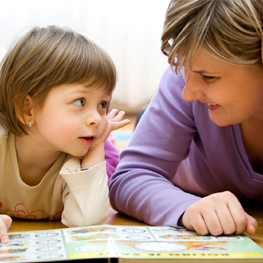
Every child reacts differently to news that a new baby is coming. Some children will be very excited and can’t wait for the baby to come. Other children may be hurt or worried that you’ll no longer have time for them - although they might not be able to tell you that. Your older child may be just learning to share. When a new baby arrives, your older child must learn to share the most important thing to them: your love and attention.
Leslie Barker, a nurse and parenting educator with Alberta Health Services’ (AHS’) Provincial Early Childhood Team suggests that warmth and structure will help ease the transition for your older child.
“Your older child needs to feel that they are not being replaced - that your love for them hasn’t changed. You can help your child adjust by keeping routines as normal as possible and by providing warmth and structure. This means showing your love with your patience, kind words and actions, giving your child information and letting them help depending on their level of development.”
Provide warmth:
Tell and show your older child how much you love them.
Spend some time alone (even a few minutes) every day with your older child.
Tell your visitors how helpful your older child has been to you and your new baby.
Tell your older child stories about their birth (e.g. how you felt; what they were like when they first came home). Help them see how big they have grown.
Read books about babies and big sisters and brothers with your older child.
Provide structure:
Give your older child information about how:
- new babies need lots of care.
- they can help (e.g. getting you a diaper; singing a song to the baby).
- to be gentle with the new baby.
- babies can’t do some things (e.g. running, playing, climbing and reading books) until they’re older.
- to keep your routines (e.g. bedtime and mealtime) as normal as possible; you may want to wait to toilet teach your older child until you’ve settled in with your new baby and things are more predictable.
Telling your older child about where babies come from
When you bring a new baby home, your child may have questions about where the baby came from. Answer your child’s questions honestly, using simple language and correct words when talking about parts of the body.
“By keeping the explanations clear, accurate and based on your understanding of your child’s stage of development, you will help satisfy their natural curiosity,” says Jennifer Munoz, Health Promotion Facilitator with Alberta Health Services’ Provincial Reproductive Health Team.
“Another key factor is repetition. Children often don’t understand fully the first time, so be prepared to tell your story several times.”
You may want to say that a baby:
- grows in the uterus.
- is born through the vagina.
For more age-appropriate ideas about talking to your children about sexual health matters, visit www.teachingsexualhealth.ca.
This information contains excerpts from Alberta Health Services’ Healthy Parents, Healthy Children - The Early Years. For more information on topics related to pregnancy and being a parent, and for information on where you can pick up print copies of the Healthy Parent, Healthy Children resources, visit www.healthyparentshealthychildren.ca.
The Healthy Parents, Healthy Children resource team is a part of the larger Healthy Children and Families Team of Alberta Health Services. Visit www.healthyparentshealthychildren.ca or visit your local community/public health centre for a print copy, find them on Facebook at Healthy Parents, Healthy Children, follow them on Twitter @AHS_HPHC. For questions or comments, contact This email address is being protected from spambots. You need JavaScript enabled to view it..
Calgary’s Child Magazine © 2024 Calgary’s Child